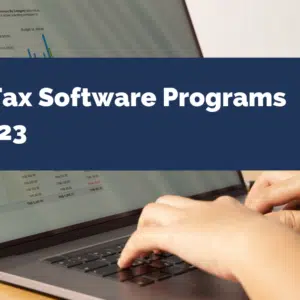Ever been in a situation where you’ve had somebody staying with you for an extended period of time?
Maybe it was the relative that was going to stay with you for a “brief period of time” until they “got back on their feet”.
Heard that one before?
Or maybe you’ve had to have a parent move in with you where you’ve had to take care of them.
If you find yourself in a similar situation, you might be wondering what tax deductions are in store for you.
Navigating the intricacies of tax deductions can be a daunting task, especially when you have an extended family member or a parent living under your roof.
Understanding how to claim someone as a dependent on your tax return can make a significant difference in your financial situation, potentially lowering your taxable income and increasing your return.
The following list of my favorite tax preparation software makes understanding the tax deductions you qualify for simple and understandable.
To be able to claim a dependent on your return (and don’t forget to file by the tax deadline), there are 5 tests that you have to pass in the eyes of the IRS.
Here they are:
Table of Contents
- The Support Test: Providing Financial Stability
- Gross Income Test: Understanding Earning Limits
- Relationship or Member of Household Test: Defining Connections
- Joint Return Test: Assessing Marital Status
- Citizen/Residency Test
- Consulting with Professionals: Ensuring Accuracy and Compliance
- Conclusion: Maximizing Your Tax Benefits
The Support Test: Providing Financial Stability
To pass the Support Test, the taxpayer must have provided more than half of the total financial support for the claimed dependent during the tax year. This encompasses various aspects of daily living including food, shelter, clothing, medical care, education, and other essential needs.
Special rules apply in cases of multiple-support agreements, where two or more people collectively contribute to more than half of a person’s support. In such situations, the parties involved may decide amongst themselves who will claim the dependent.
Gross Income Test: Understanding Earning Limits
The dependent must have a gross income below a certain limit set by the IRS. For instance, in 2021, this limit was $4,000, and it increased to $4,300 in 2021. It’s important to note that this income threshold is subject to change annually.
However, this gross income test does not apply if the dependent is a child under 19, or under 24 if a full-time student, by the end of the tax year.
Relationship or Member of Household Test: Defining Connections
The claimed dependent must either be related to you in a specific manner (such as child, sibling, parent, or other close relative) or must have lived with you for the entire tax year as a member of your household.
There are exceptions and specific criteria for various relationship types, ensuring that even if a relative doesn’t live under the same roof, they might still qualify.
Joint Return Test: Assessing Marital Status
The IRS devised the joint return test to assess if you can claim another person as a dependent on your taxes. The joint return test basically asserts that if you can file as married filing jointly, you can’t be someone else’s dependent.
For example, if you are married and may file jointly, your parents will be unable to claim you as a dependent on their return.
However, there are two exceptions to the joint return test. You can still qualify as a dependent if both of the following conditions are met:
- You or your spouse file a combined return solely to receive a refund of taxes withheld.
- You would not owe tax if you and your spouse filed separate returns.
Citizen/Residency Test
The citizen test, as defined in Internal Revenue Code Section 152, is one of numerous requirements that must be completed before someone can be claimed as a dependant. The connection, age, residency, joint return, and support tests are the others.
A citizen of the United States is either born in the United States or meets the requirements of naturalization, which is a legal process established by Congress.
When certain circumstances are met, U.S. citizens with children born outside the United States and who do not habitually reside in the United States can complete the Application for Certificate of Citizenship to apply for citizenship for their children.
Furthermore, both the parent and the child must meet with a U.S. immigration officer, and the child must meet the required circumstances for taking the Oath of Allegiance.
If you were a US citizen when your child was born, even if the other parent was a nonresident and the child was born in another country, the child may be a US citizen.
In this situation, the child is your dependant as long as the other dependency standards are met, and you may claim the exemption—even if the child lives abroad with the nonresident parent.
If you are a US citizen living in another country and have lawfully adopted a kid who is not a US citizen or resident, and the other dependency requirements are met, the child is considered your dependant.
As a result, if your home is the child’s primary residence and the youngster is a member of your family for the full tax year, you may claim the exemption.
Consulting with Professionals: Ensuring Accuracy and Compliance
Given the complexity of tax laws and the potential for changes each year, it is highly advisable to consult with a tax advisor or professional to ensure that you are in compliance with current laws and making the most of your tax situation.
Conclusion: Maximizing Your Tax Benefits
Claiming a dependent on your tax return can offer substantial financial benefits, but it is imperative to fully understand and comply with IRS regulations.
By diligently following the five tests and considering the additional factors mentioned, you can confidently navigate through tax season, ensuring that you are maximizing your benefits while adhering to legal requirements.








i can not find the threshold amount for m/f/j pertaining to dependent exemption
or for any exemptions